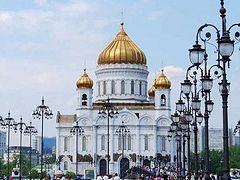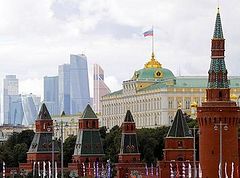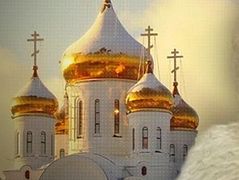Nowadays, when the entire Orthodox community is anxiously monitoring the media, people tend to share news through social networks without properly understanding them. In this situation, the chances of believing fake news and misleading many people are quite high. The consequences are even more dangerous when people attempt to figure out what is happening in a Local Church, while relying on questionable sources and jumping to sometimes far-stretched conclusions. Considering one relatively recent Church-related provocation of the extremely Russophobic faktor.bg,1 I believe it is time to sort the wheat from the chaff.
The first thing that I’d like to remind well-meaning Russian analysts is that Bulgaria is a member of the European Union and NATO, so its mass media is oriented accordingly. There were some positive changes in the Bulgarian mass media in the recent years because Russophobia is extremely unpopular in the country, but it is not an indication of any dramatic changes. More likely this demonstrates how flexible politics can be. It is a drop of truth in the ocean of lies, a small concession to “another point of view”, as it is not possible to brainwash an entire population that for the most part knows the Russian language and has access to information published on Russian websites.
Russophobic mass media is invariably anti-Church and its actions are in opposition to Orthodoxy as a whole
It is extremely important to note that all Russophobic mass media is invariably anti-Church and its actions are in opposition to Orthodoxy as a whole. Over the course of many years, they regularly attempt to discredit Orthodox hierarchs and regular priests, sow discord among the Orthodox community, and launch various provocations for “internal consumption” and for “export”, resorting to defamation, intricate lies and unscrupulous slander. When the Bulgarian Orthodox Church does anything that contradicts the “civilized choice” of the country, all mass media’s cracker-barrel Atlanticists attack it, suspecting it of latent Russophilia or accusing it of playing up to Moscow and carrying out Kremlin-financed subversive activities. Among other things, these attacks may be caused by the resolution of the Holy Synod of the Bulgarian Orthodox Church against ratification of the Istanbul convention,2 opposition to gay parades, appointment of a “wrong” bishop, refusal to recognize Macedonian dissenters or support the Ukrainian schismatics, or visits of some Bulgarian bishops to the parishes of the Russian Orthodox Church.
According to psychiatrist and theologian Nikolai Mikhailov, during the years of so-called democracy, Russophobia in Bulgaria became a professional activity that was mastered by “the anthropological clones of the former Komsomol cadres, young party activists and, to a certain extent, humanistic intellectuals of that period ... They have different titles now, but their mindsets and goals are the same. They act as self-appointed guardians of the new ideological orthodoxy.”3 Interestingly, in some cases even the titles didn’t change, as aging Komsomol functionaries, USSR-trained teachers of scientific communism, children of high-ranking officials of the Communist Party of Bulgaria, former employees of the national security service, and even informers and other “victims of the regime” transformed into the messengers of “freedom” and sometimes even “teachers” of the Church. Under the former ideological system, the Church was persecuted, but nobody forced it to abide by the Code of the Builder of Communism instead of the Ten Commandments. Nowadays, it looks like neo-liberalism’s goal is to prevail everywhere, including the Church, and the appropriate ideological platform is being developed for this purpose.
Here’s what Atanas Slavov, Doctor of Law, suggests in his article The Two Political Worlds of Modern Orthodoxy published in the Bulgarian Christianity and Culture magazine:
“The new model of Orthodox theology proclaimed at the Crete Council is consistent with the establishment of a comprehensive and profound understanding of dignity, personal freedom, individual rights, and the pluralistic nature of civil society by the constitutional democracy and law-governed state. Without changing its transcendental foundations and profound theological doctrines, Universal Orthodoxy is gradually coming to terms with political modernism (liberal democracy, human rights, supremacy of law) to facilitate the conveyance of its profound message to its contemporaries.”4
Universal Orthodoxy gradually comes to terms with political modernism
Naturally, Russia and the Russian Orthodox Church are portrayed as the main obstacles on the path of progress. That is why Svetoslav Ribolov, senior lecturer of theology, teacher of the theological department of Sofia University, predicted the following developments in his article published in the same magazine:
“Considering the growing tensions between increasingly radicalized Orthodox people and traditionally Orthodox people, it is quite likely that in the near future the Orthodox Church will split into two Churches. One Church will be pro-Western. It will be based in Constantinople and continue to coexist peacefully with Western democracy and abide by the basic European values and laws. The other will be the Moscow-based pro-Russian Orthodox Church that will denounce democratic human rights and the European law system.5
Christianity and Culture magazine and the Culture website inundate their Bulgarian viewership with so many “traditionally Orthodox” scholars (theologians, philosophers, historians, or “public figures” as they call themselves) peacefully coexisting with basic European values, that one can’t help but quote Valeriya Novodvorskaya. During the Faith and Society program on Bulgarian TV, she said, “Christianity is not for fools!”6
The introduction of the Faith and Society program on the taxpayer-funded Channel 1 of BNT is an upside-down image of the Savior and Holy Mother of God, which gives away the true purpose of this project and its message. Goran Blagoyev, Doctor of History, the author and full-time host of the program, constantly reminds his viewers that his goal is to search for the truth that will make them free. He worked hard to debunk the Russophiliac “myths” and “expose” the Russian saints (whom he considers the embodiment of “Imperial influence” in the center of the Bulgarian capital). In particular, he denounced the Right-Believing Prince St. Alexander Nevsky in whose honor the Patriarchal Cathedral in Sofia is named and St. Seraphim (Sobolev), a widely revered saint in Bulgaria whose remains repose in the metochion church of the Patriarch of Moscow and All Russia.7 This only resulted in Goran Blagoyev’s studio becoming free of any representatives of the Bulgarian Orthodox Church as the resolution dated February 6, 2016 of the Holy Synod of the Bulgarian Orthodox Church forbade its bishops and clergy to participate in the Faith and Society program.8
The Doors of Orthodoxy, a pseudo-religious site nicknamed by the Orthodox Bulgarians as “the gates of hell”, is also allegedly searching for the truth. “As a volunteer project, we enjoy absolute independence and dedicate our efforts to searching impartially for the Truth,” claims the project team. However, the claim of “absolute independence” is disproved when we read the “Our Partners and Friends” section in the Doors’ website. Their impartiality is clearly discredited by their acrimonious, biased and often slanderous publications about the Russian Orthodox Church and its hierarchs, and translations of articles from Credo.ru and other libelous Russian blogs. The derogatory penname Slavka Bozhkova,9 caricatures published in the site’s Cartoon of the Week section, and the satirical edition the Church Egotist that is not averse to publishing obscene jokes clearly indicate that this project is not Orthodox at all.
Euro-Atlantic, i.e. anti-Russian, secular media, websites, blogs and Facebook profiles are so numerous that it is impossible to list or even count them. They are generously financed and designed to cater to people with various social, intellectual and spiritual backgrounds. Hysterical, strident, intrusive and unconvincing, they repeat the same clichés over and over again, distributing lies and turning everything upside down.
Russophobia in Bulgaria is not aimed at Bulgarian people, its purpose is to turn Russian society against Bulgaria
The triumph of democracy and freedom of speech in Bulgaria is best demonstrated by Anti-Democratic Propaganda in Bulgaria, a report published in the spring of 2017 by the Non-Governmental Organization called The Humanitarian and Social Studies Foundation.10 The study was financed by the “America for Bulgaria Foundation”,11 the local hirelings and hucksters of Russophobic content (the fund’s motto is American Optimism Meets Bulgarian Potential). The report listed the mass media, websites and authors who dared to doubt liberal values and demonstrate pro-Russian leanings. The number of such publications was recorded with the scrupulosity of an accounting report, and their content was meticulously analyzed.12 The report noted a dramatic increase of anti-democratic propaganda in Bulgaria and growth of Russophilic sentiments. This observation is correct, but it should be noted that the real sentiments of Bulgarian society are represented only by a small number of newspapers, magazines, TV programs and websites.
In one of such “anti-democratic” programs, Vasil Vasilev, a journalist and social activist, said that Russophobia in Bulgaria is not directed at the Bulgarian people, the majority of whom are unwilling to change their good disposition toward Russia. The goal is to turn the Russian people against Bulgaria.
Will this goal be attained? It is up to us.
1 In its publication dated January 25, 2019, the extremely Russophobic tabloid site Faktor.bg alleged that Patriarch Neofit of All Bulgaria supported the Independent Church for the Independent Country concept at the Synod meeting. Later, Metropolitan Cyprian of Stara Zagora, the chairman of the Synodal Committee for the Matters Related to the Ukrainian Church, said that this topic was not even discussed at the meeting. “Considering that Ukrainian websites distributed information stating that the Bulgarian Orthodox Church (Bulgarian Patriarchate) supported the idea of autocephaly of the Orthodox Church of Ukraine, as a Chairman of the Committee for the Matters Related to the Ukrainian Church, I assure you that the Holy Synod did not discuss the matters related to Ukraine and no resolution was adopted by the supreme body of the Bulgarian Orthodox Church (Bulgarian Patriarchate) regarding this canonical dispute… We ask all Orthodox people and media to use only reliable information published by the Holy Synod of the Bulgarian Orthodox Church (Bulgarian Patriarchate) to avoid misinterpreting the situation around the Church dispute in Ukraine.” Metropolitan of Stara Zagora, Cyprian, Chairman of the Committee for the Matters Related to the Ukrainian Church. Faktor.bg ‘s fake news was quoted not only by Ukrainian mass media, but by some Russian mass media as well.
2 “This is an attempt to legalize ‘a third gender’.” The Holy Synod of the Bulgarian Orthodox Church speaks out against the Istanbul Convention of the Council of Europe. // https://pravoslavie.ru/110330.html.
3 Nikolai Mikhailov, «Защо Русия граничи с Бога» // http://rusofili.bg/защо-русия-грничи-с-бога/
4 Славов Атанас. Atanas Slavov, «Два политически свята на съвременното православие» // http://www.hkultura.com/news/detailed/1844
5 Риболов Светослав. Svetoslav Rybalov, «Предизвикателството към европейските ценности от неконтролираното мигриране към ЕС» // http://www.hkultura.com/issue/2017/118/.
6 Goran Blagoev, История за плач и надежда (Сиела, 2011), 388.
7 Алексеева Янина. Yanina Alexeyeva, «Святитель Серафим – 'дядо' всея Болгарии» // https://pravoslavie.ru/101331.html.
8 Решение на Св. Синод от 06.02.2016 г.: духовници на БПЦ-БП да не участват в предаването «Вяра и общество» по Канал 1 на БНТ // http://www.bg-patriarshia.bg/news.php?id=199789.
9 “Slavka” is a form of a Slavic first name, but the root means “glory”, while “Bozhkova” is a form of Slavic surname but the root means “God”. So the penname is a sort spoof on the phrase, “glory be to God”.—Ed.
10 ДОКЛАД: Антидемократичната пропаганда в България // http://hssfoundation.org/доклад-антидемократичната-пропаган/
11 Американският оптимизъм среща българския потенциал // https://www.us4bg.org/?hl=bg
12 Медии и пропаганда след Студената война // http://hssfoundation.org/wp-content/uploads/2018/05/KX-47-Print-01_05_2018-re.pdf





